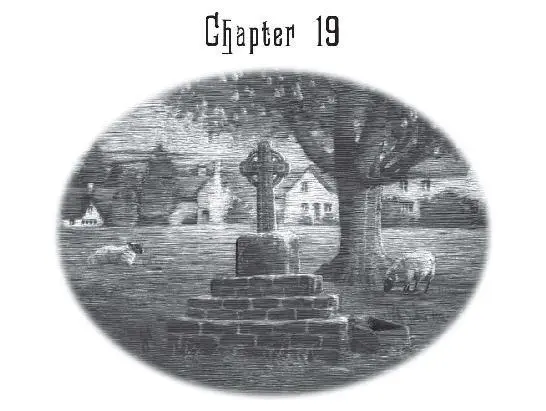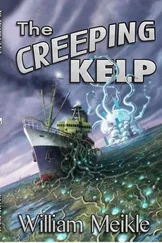“No!” With a jolt that made me spill my tea and Holly knock the codpiece clean off the suit of armor, Lockwood sprang upright in his chair. “Give me that phone! It’s Danny Skinner, from Aldbury Castle?”
“Er, yes. Yes, it is. Why?”
Lockwood grabbed the receiver and put his feet up on his desk. “Look up the train schedule! Pack the bags! Cancel any appointments for tomorrow! Is that you, Danny? Lockwood here. We’re going to accept your fascinating invitation after all.”

Lockwood’s sudden enthusiasm for the Aldbury Castle case was startling, not to mention suspicious, but he was evasive when we interrogated him. “It’s clearly a fascinating cluster,” he said. “All sorts of interesting features. That weird Creeping Shadow story, for a start—didn’t you think that was worth investigating?” He gave us one of his widest smiles. “At the very least, it’ll get us away from London for a bit. We know the Winkmans were looking for Lucy a few days ago, and they’re bound to be after us all now that we’ve raided their night-market. It’ll get us out of harm’s way until the heat dies down.”
“I don’t feel particularly threatened,” I said.
“Ooh, anything could happen, Luce. Anything. Bit of safe country air will do us a world of good….” He tapped his fingers on the desk. “Will there be anything else?”
“So the fact that there’s an outpost of the Rotwell Institute a couple of miles up the road from the village doesn’t have any bearing on it, then?” George said. That had been my thought, too.
“Oh, you remember that?” Lockwood wore his blandest expression. He scratched the side of his nose.
“Of course we do. Danny Skinner mentioned it, didn’t he? He said they’d paid no attention to the problems of the village. Is it one of the research facilities on Holly’s list?”
“Well, as a matter of fact it is ,” Lockwood said. “One of several, mind you, so there’s no guarantee it’s going to be relevant at all….” He shrugged. “Okay, look, I wouldn’t say the presence of that base has put me off , exactly. We might take a squint at it while we’re down there, assuming all the ghosts tramping around the place give us any peace. But the village is our primary concern. That’s what we’re being hired to sort out, and if we’re going to head down there tomorrow, we’d better get ready.”
The rest of the day passed swiftly. Lockwood sent George off to the Archives to research anything to do with the village and its history; he sent Holly to Mullet’s to order fresh salt and iron and arrange for them to be delivered to Waterloo Station. And he himself departed on a couple of errands, about which he was uncharacteristically silent. The results of one of these trips was dramatically revealed the following morning when we arrived at the station and saw a gaunt figure in black waiting on the platform beside the sacks of supplies.
“Hardly recognized you there, Kipps,” George said, “without your swanky jacket and sword. I thought if you took them off, you’d fall apart into separate wriggling pieces.”
It was true that Kipps looked different. Perhaps more than any other operative, he had been defined by his connection to the Fittes Agency. His jeweled rapier, the unnecessary tightness of his trousers, the cocksure spring in his step—everything had always trumpeted his excessive pride in being a member of the organization. Today he wore black jeans, a turtleneck, and a black zip-up jacket. Perhaps his jeans were a trifle tight, his boots a trifle pointy, but it was fairly sensible attire, assembled almost without vanity. Fortunately he hadn’t entirely changed. He still possessed his air of ineffable gloom.
“I just had a realization,” he said when we were on the train and rocking slowly through the south London suburbs. “After the Guppy job. I mean, there we were—in a house possessed by a wicked and powerful entity, and you all were running around like madmen—fighting, screaming, being fools—but dealing with it…and I was just a fifth wheel. I couldn’t see it, I couldn’t hear it…I was too old to do anything useful. And that’s what being a supervisor is: it’s a life of sending others out to fight and die. I’ve known that for a while, but it took you to make me realize I couldn’t bear to continue with it. I couldn’t stay at the Fittes Agency. I’d rather do something else.”
“Like what?” George said. “Art critic? Train buff? With that turtleneck, you could be almost anything.”
“It was probably another dumb decision,” Kipps said. “Like agreeing to come along with you today. Lockwood says he wants my expertise, but I’m not sure what I can contribute aside from standing around like a fence post. Maybe I can make the tea.”
“Actually, I think it’s admirable,” I said. “Your decision. It’s about being true to yourself.”
He grunted. “You’re good at that, certainly. That’s why you’ve come back to Lockwood and Company, I suppose.”
“As it happens, I’m only temporarily—” But the train was rattling over a particularly loud section of track, and then Lockwood and George were arguing over who would carry the salt bags, and Holly was handing biscuits around, and I couldn’t get a word in edgewise. I sat in a corner of the compartment by the window, staring at the reflection of myself that ran like a ghost over the vista of gray roofs.
How had it come to this, tagging along with Lockwood once again? Was I truly like Kipps, rudderless and cast adrift from purposes of my own? A subtle shift had come over me in the last few days; a realization that I had allowed myself to change direction. After the loss of the skull, after Harold Mailer’s murder and the pursuit through Clerkenwell, I’d needed help badly—and Lockwood had offered it. There’d been no one else to turn to. It had been a good decision. But after that—how one thing led to another!—it had seemed only natural to stay on at Portland Row, only natural to let Lockwood help me retrieve the skull, only natural to help him hunt for it in the night-market….And now—was it natural to accompany him to Aldbury Castle, too? Sure, I could invent plenty of excuses to justify it. I was keeping myself safe from the Winkmans. I was (perhaps) pursuing the Rotwell Institute and the missing skull. I was giving Lockwood & Co. the support they deserved….All that might well have been true. But it boiled down to the same thing in the end. I was simply happy to have the chance to be with them again.
It was with inconclusive thoughts like these that I occupied myself as the train left London and dawdled its way into the countryside. By ten o’clock, without danger or alarm, we had reached our destination.
For those wanting a detailed record of the horrors that subsequently unfolded, the village of Aldbury Castle occupied a pleasant rural location fifty miles southwest of London. It was set in chalk uplands, with wooded rolling hills on three sides, and a leisurely river winding on the other. The site was remote, reached only by a meandering road, and by a train stop (it would be a stretch to call it a station) on the main Southampton line, three quarters of a mile away to the west. There was no station office or building of any kind, just a white and winding path running off into the forest, to join the road on its way to the village.
If there ever had been a castle in the area, it had long vanished. The road crossed the river on a stone bridge, and then bisected the village green—a broad expanse of long dark grass, surrounded by cottages. Sheep grazed here. Three great horse chestnut trees dominated the center of the green, casting into shadow the fourteenth-century market cross and the trough rotting beside it.
Читать дальше










